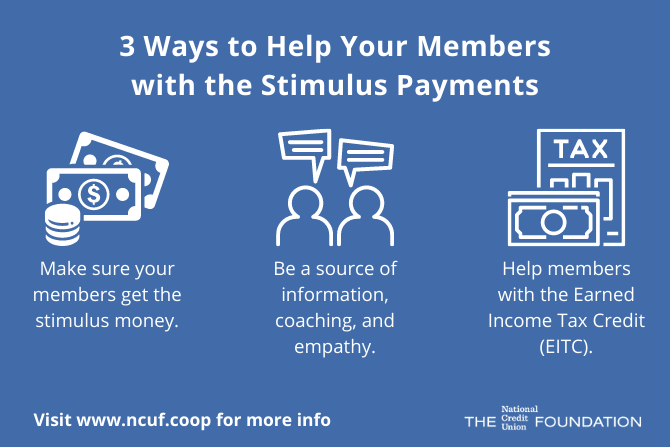3 ways credit unions can help members with the new stimulus payments

As the second round of economic impact (stimulus) payments begin rolling out, we want to provide some advice for credit unions on how to best help their members. The Foundation provided some guidance during the first round of stimulus with 6 tips to share which can be viewed here.
We acknowledge that so much has changed since then and Americans are struggling financially. A survey by Highland found:
- 64% of millennials are living paycheck to paycheck.
- 42% say they have taken on more debt than they normally would apart from buying a home.
- Overall, 47% say they have run out of their emergency savings funds.
- If they were faced with a surprise $500 expense, 82% say they would not be able to afford it.
The first job for credit unions will be understanding what’s what. The new stimulus package is a 5,600 page monster with loads of detailed help in a variety of areas from stimulus checks, to tax credits to access to rural broadband.
With respect to credit unions’ focus, here are three ideas to help you help members and their financial well-being:
- Make sure your members get the stimulus money: According to the IRS, upwards of 9 million people eligible for the first round of stimulus money from the spring did not receive those funds. To ensure that members receive their checks, provide them with the basic outline of how they should receive the money – either by check (by January 15, 2021) or by direct deposit. Offer them the links to resources like the IRS page that explains how payments are being made.
- Be a source of information, coaching and empathy: Help members talk through what’s going on in their life and where the stimulus check can do the most good from a financial well-being perspective. Help them understand other provisions of the law which may allow them to use a 2020 Flexible Spending Account (FSA) through all of 2021, understand the moratorium extension on rental evictions, or receive additional food assistance support through the federal SNAP program. This article has a great summary of the basics. Note that it is equally important that a credit union share this information with its own staff who might be facing similar challenges.
- Help members with the Earned Income Tax Credit (EITC): Tax refunds are a big deal for a lot of people. Research has shown that many people wait for that biggest, one-time cash infusion in the year to pay for deferred health care, pay down debt and make deferred purchases. For folks who didn’t earn enough money to qualify for the EITC, the new law allows people to claim the EITC and the refundable portion of the child tax credit with a “look back” provision to earnings in 2019. We recommend this article which walks through some numbers to demonstrate the huge difference claiming the EITC can make in a family’s financial life. If you are at all involved in helping members with tax preparation, this will be a key provision to focus on.
In the second point, I mention empathy. We know the challenges that come with practicing empathy, and also the importance of listening first to understand the person’s needs and avoiding judgment or making assumptions. The Foundation has some resources to help you practice empathy including five tips for you and a free empathy e-school in partnership with CUNA.
We hope this is helpful to you in empowering your members to make the best financial decisions for their personal situation. Please reach out if you have any questions or if we can provide any additional information around practicing empathy.


